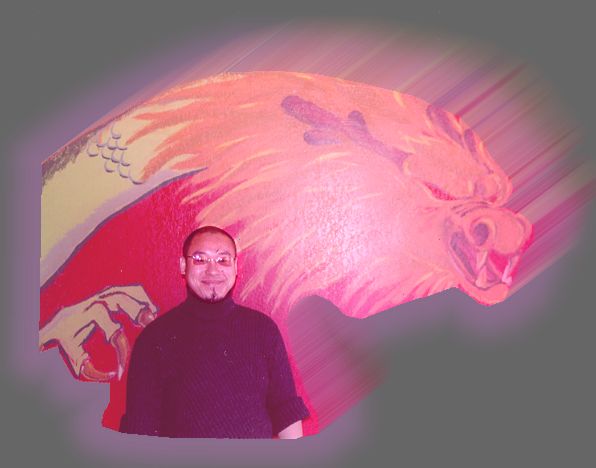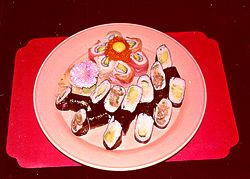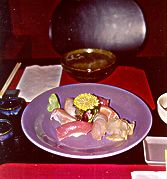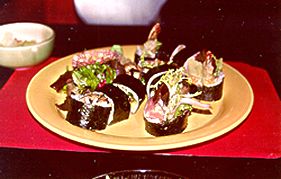
Cool Hand Eddy
Story and photos by Kathy Nguyen
Eddy Wong has tried just about everything, from busing tables and doing dishes to selling paint, dealing cards, and working as an apprentice chef. He seems to have found his calling in the latter occupation. The 29-year-old man from Macao opened his own restaurant, Biiru Biru, in March of this year.
Although Eddy has been in business for less than a year, few places among the legions in San Francisco can match his artistry when it comes to sushi. Perhaps that's because Eddy received his training the old-fashioned way, working alongside a master chef for nearly eight years. In Japan, apprentice chefs train with a head chef for at least that amount of time before they can earn the venerable title of sushi chef.
In this neck of the woods, where raw fish has become as popular as organic vegetables, one can become a sushi chef in three short months. Just ask the California Sushi Academy in Venice, Calif. Since opening its doors in September 1998, the vocational school has graduated nearly 200 students, 80 percent of whom have gone on to careers in the sushi business.
The Japanese food fad of the nineties has come and gone, according to Eddy. "Now it's all about fusion," he says, referring to the East-meets-West food craze that has taken San Francisco by storm. He contends, "Fusion is just a glorified marketing term. They used to call it California cuisine."
With roots in Macao—a city whose cultural diversity stretches back more than 400 years, to its time as a Portuguese settlement—Eddy's seen his fair share of eclectic mixing in everything from food and fashion to music. "The trick is to make sure the customers get what they're paying for. It has to be worth it or they won't come back," he says.
But Biiru Biru doesn't exactly fit into the fusion category. In fact, the menu features basic Japanese fare such as chicken teriyaki, grilled steak marinated in miso, and sake and nabeyaki udon noodle soup served in a hot pot; there is also a full sushi bar with a few inventive twists. Eddy's take on the fusion theme appears in dishes like Cajun salmon sautéed with artichoke hearts and sun-dried tomatoes. And he's probably the only sushi chef in town who puts garlic in his sushi rolls.
Biiru Biru's modern décor and nightclub ambiance also set it apart from traditional Japanese sushi bars and the latest fancy fusion setups. Biiru Biru has a sleek bar with vibrant red walls exhibiting industrial metal art, track lighting suspended from a black ceiling, and smooth black tables and chairs offset by throbbing techno beats.
When Eddy first started his venture, he envisioned a cool place with a wraparound bar where people could gather to drink, listen to music, and eat sushi—until three in the morning. And he came up with a fittingly playful name—Biiru Biru, which loosely translated means "beer construction" in Japanese. But when Eddy had trouble getting a hard-liquor license, he had to alter his dream of becoming a bar owner. Instead, he concentrated his energies on opening a restaurant with a style all its own. He invested everything he had in the construction of the restaurant and kept the playful name.
After years of working for others at places like Toraya in Japantown and Dojima-An on O'Farrell, Eddy is finally able to express the freedom that comes with being a restaurant owner and chef through his unique sushi creations. And for Eddy, it's not just about presentation—though he definitely has an instinctual aesthetic flair. The sushi at Biiru Biru—nigiri (raw fish) and maki (rolls made with seaweed)—is served on large colorful platters with crisp mixed greens in a light vinaigrette topped with a lovely flower garnish. In thought and care, Eddy's creations easily rival those seen in the pages of Art Culinaire. The freshness of the fish, and the perfect combination of rice sweetened with vinegar and sugar and punctuated with green scallions and a tinge of wasabi and spice, give total satisfaction in every bite.
Eddy's simple yet provocative avocado-and-cucumber rolls pack a wasabi punch; while the more elaborate deep-fried sushi rolls, wrapped with tuna and topped with a spicy-sweet sauce, practically melt in your mouth. The house specialties, which change nightly, are equally exquisite. Meaty portobello mushroom rolls are layered with fresh garlic. Hamachi (yellowtail) rolls are accented with roasted garlic, avocado and spicy chili sauce.
According to Eddy, one key factor in making great sushi is the chef's ability to control the amount of moisture on his hands when wrapping the sushi in paper-thin sheets of seaweed. When rolled properly, the seaweed wrapper retains a slightly crispy texture and doesn't become soggy. The seaweed must be moistened before rolling or it'll crumble; yet using too much water causes the glutinous rice filling to break and stick to the fingers. "Most chefs keep a bowl of water next to them and only dip their fingertips before rolling the sushi. This requires a deft hand, and it's the main difference between beginners and pros," Eddy says.
Fresh fish is the other key factor. "The highest quality, sushi-grade fish has a firm meat and bright color. Fatty tuna should be as white as possible and regular tuna should be bright red. Fish shouldn't be oily, even the oily-fish variety, and it should never have any bones."
There's no bones about it. Eddy's is the best sushi in The City, hands down.
Biiru Biru
445 Balboa Street
San Francisco, CA 94118
Tel: 415.933.7100
Fax: 415.387.4666
www.biirubiru.com
Open Sun. - Thurs. 5 to 11 p.m.
Fri. - Sat. 5 p.m. to 12:30 a.m.


